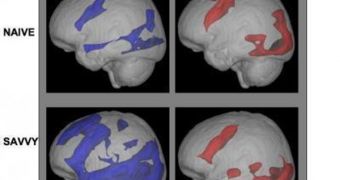In spite of the criticism parents have subjected the Internet to, in terms of the damage it can cause to their children, recent scientific studies by researchers at the University of California in Los Angeles (UCLA) have shown that using the World Wide Web can, in fact, boost the brain functions considerably. The experts add that the results are visible with imaging methods just one week after first-time Internet users began their online experience, ScienceDaily reports.
In the new research that was funded by the Parvin Foundation, the team used functional Magnetic Resonance Imaging (fMRI) scans to look into the brain activity of 24 neurologically normal volunteers, aged 55 to 78. “We found that for older people with minimal experience, performing Internet searches for even a relatively short period of time can change brain activity patterns and enhance function,” UCLA Semel Institute for Neuroscience and Human Behavior Professor of Psychiatry Dr. Gary Small says. He is the author of the new study, and also the author of the book “iBrain.”
The team's results, which were showcased at the 2009 meeting of the Society for Neuroscience, on October 19, show that searching for information online may be a form of mental exercise. Oddly enough, after two weeks of searching for data on the Internet for about one hour per day, even naive test subjects exhibited the same level of brain activity as savvy Internet users, who had been doing this for a longer period of time.
“The results suggest that searching online may be a simple form of brain exercise that might be employed to enhance cognition in older adults,” Semel Institute senior research associate and first study author Teena D. Moody says. During online searches, the working memory needs to be exercised, so as to keep various things “at hand.” The wealth of information online forced the participants' brains to improve their synthesis skills, by extracting only the relevant information from the huge blocks of texts they came across during their inquiries.

 14 DAY TRIAL //
14 DAY TRIAL //